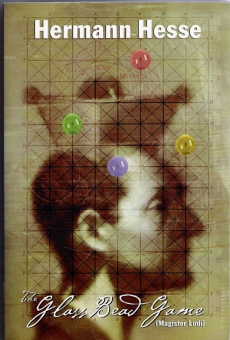Das Glasperlenspiel - Hermann Hesse (Updated)
Just finished this book :) Review will follow tomorrow hopefully.
____________________________________________________________________
Ok, here comes my review.
I read this book for quite a long time and with pleasure, but still got a feeling of not understanding it completely. So I made a little research about the author and his novel The Glass Bead Game (Das Glasperlenspiel).
Hermann Hesse (1877 - 1962) is German poet, writter and painter. He got Nobel prize in Literature in 1946. The Glass Bead Game is on of his most well known writtings. H. Hesse was interested in theological writtings, Greek mythology, got inspired by Shopenhauer and budhism. He was stronply against nazis and war.
He started The Glass Bead Game already in 1931, first published in 1943, Swiss. When nazis banned his writtings, this novel served as spiritual haven from political conflicts and war. It is his last novel as well.
The Glass Bead Game tells about intelectuals living in fictional province in 23rd Century called Castalia. Do mind, that novel isn`t science fiction! Intelectuals live in monastic order, mainly care only about different arts - music, philosophy, mathematics etc. Glass bead game - the greatest art of them all - is about connection different usually not connected disciplines in reality, for example music with arhitecture. The best of Game players becomes Magister Ludi. Main character Joseph Knecht is very talanted student and Castalia`s citizen. He becomes Magister Ludi and is brilliant at his work, but with time he understands, that he needs to do more, do something else to help the real world understand and love Castalia (if real world will lost it`s need in those spiritual workers, it wil be end of Castalia. So he resignes from his position and leaves Castalia to teach his friend Designori son. Tragedy lies in the obstacle that Castalia has made him unsuitable for his longed real life...
To what conclusion I came? The Game symbolize the ways how humans construct realities; to understand the reality one needs to understand many things, questings, sciences etc. and has to be able to connect cause with results. Besides, this book is much about following one`s destiny and fulfilling it.
As I said previously, this book is like real chokolate. To really get the taste, one needs to read slowly. H. Hesse uses long sentences, references to other musical works and writtings as well as rich language. I read this book in my native language (so I`m not able to write down some quotations, sorry for that) and I shall say that I didn`t know many words :D
Not everyone will like this book. Some will put it back in shelf not getting through first fifty pages about what is Castalia and glass bead game (these ones were boring for me....).









1 comment:
Glass Bead Game is the most complex of Hesse's work. I think the mistake people make is taking the characters, plot, setting in literal terms. Ultimately, Glass Bead Game is best appreciated as metaphor -- an elaborate, detail-rich metaphor of the unconscious struggle with the world of conception and idea, and the world of actual experience. It is also revealing to look into the book's subtleties. Hesse doesn't come out directly and tell us what he's doing, he intends for us to earn it. We must remember that the book is about the famous Joseph Knecht (the perspective implies a future wholly influenced by him). The setting is an intellectual community, reaching it's zenith of thought. Castalia is presented in overwhelmingly positive terms--a harmonized utopia of art, music, and science. The focus on such an idealistic setting is often misplaced; rather, the focus should be on Joseph Knecht's famous act: rejecting, or more accurately--fulfilling the role of Castalia, and leaving the world of symbols, thoughts, and dualistic study of the external, and experiencing the world, free of the dependence of thought. This one act, seemingly has enormous consequences. We must take a step back and imagine the repercussions: a world thoroughly free of the domination of conception, both in the lives of individuals and society in general; a world which is constantly taking creative leaps of faith, and constantly becoming rather than mere witnessing or studying. Looked at in metaphorical terms, the Glass Bead Game is not a piece of literature, but rather a spiritual road map intended to influence well into the future. It is also worth noting that this is the last major work of Hesse. Is it quite easy to draw the comparison between Hesse and Knecht. The Glass Bead Game was that final leap from thought into the calm, engulfing waters of sheer being. Hesse went to the forest never to come back, but he left this special little book as a helpful guide.
Post a Comment